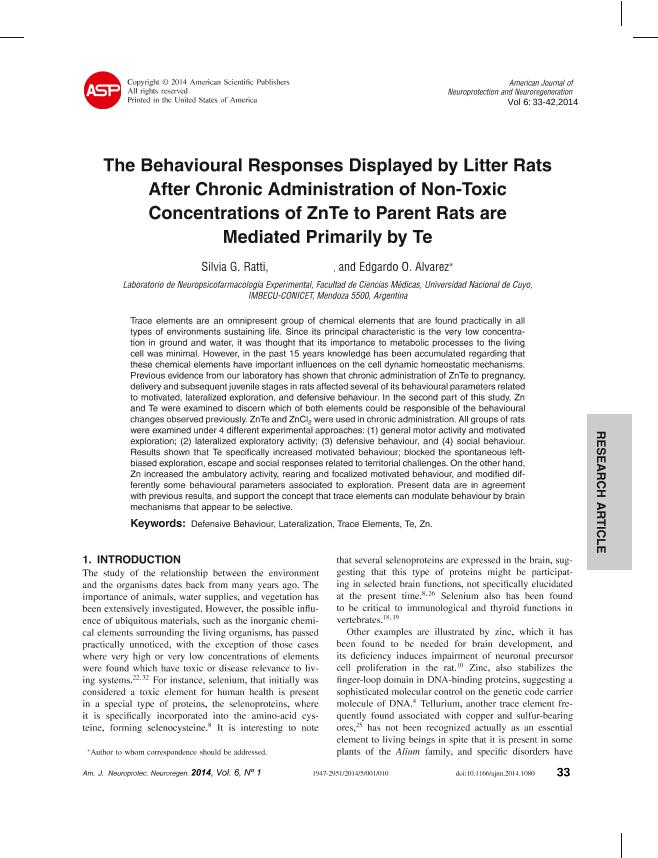Mostrar el registro sencillo del ítem
dc.contributor.author
Ratti, Silvia Gabriela

dc.contributor.author
Alvarez Toro, Edgardo Orozimbo

dc.date.available
2018-01-02T21:08:00Z
dc.date.issued
2014-10
dc.identifier.citation
Alvarez Toro, Edgardo Orozimbo; Ratti, Silvia Gabriela; The Behavioural Responses Displayed by Litter Rats After Chronic Administration of Non-Toxic Concentrations of ZnTe to Parent Rats are Mediated Primarily by Te; American Scientific Publishers; American Journal of Neuroprotection and Neuroregeneration; 6; 1; 10-2014; 33-42
dc.identifier.issn
1947-2951
dc.identifier.uri
http://hdl.handle.net/11336/32064
dc.description.abstract
Trace elements are an omnipresent group of chemical elements that are found practically in all types of environments sustaining life. Since its principal characteristic is the very low concentration in ground and water, it was thought that its importance to metabolic processes to the living cell was minimal. However, in the past 15 years knowledge has been accumulated regarding that these chemical elements have important influences on the cell dynamic homeostatic mechanisms. Previous evidence from our laboratory has shown that chronic administration of ZnTe to pregnancy, delivery and subsequent juvenile stages in rats affected several of its behavioural parameters related to motivated, lateralized exploration, and defensive behaviour. In the second part of this study, Zn and Te were examined to discern which of both elements could be responsible of the behavioural changes observed previously. ZnTe and ZnCl2 were used in chronic administration. All groups of rats were examined under 4 different experimental approaches: (1) general motor activity and motivated exploration; (2) lateralized exploratory activity; (3) defensive behaviour, and (4) social behaviour. Results shown that Te specifically increased motivated behaviour; blocked the spontaneous left-biased exploration, escape and social responses related to territorial challenges. On the other hand, Zn increased the ambulatory activity, rearing and focalized motivated behaviour, and modified differently some behavioural parameters associated to exploration. Present data are in agreement with previous results, and support the concept that trace elements can modulate behaviour by brain mechanisms that appear to be selective.
dc.format
application/pdf
dc.language.iso
eng
dc.publisher
American Scientific Publishers

dc.rights
info:eu-repo/semantics/openAccess
dc.rights.uri
https://creativecommons.org/licenses/by-nc-sa/2.5/ar/
dc.subject
Defensive Behaviour
dc.subject
Lateralization
dc.subject
Trace Elements
dc.subject
Te
dc.subject
Zn
dc.subject.classification
Salud Ocupacional

dc.subject.classification
Ciencias de la Salud

dc.subject.classification
CIENCIAS MÉDICAS Y DE LA SALUD

dc.title
The Behavioural Responses Displayed by Litter Rats After Chronic Administration of Non-Toxic Concentrations of ZnTe to Parent Rats are Mediated Primarily by Te
dc.type
info:eu-repo/semantics/article
dc.type
info:ar-repo/semantics/artículo
dc.type
info:eu-repo/semantics/publishedVersion
dc.date.updated
2017-12-29T14:14:53Z
dc.journal.volume
6
dc.journal.number
1
dc.journal.pagination
33-42
dc.journal.pais
Estados Unidos

dc.description.fil
Fil: Ratti, Silvia Gabriela. Consejo Nacional de Investigaciones Científicas y Técnicas. Centro Científico Tecnológico Conicet - Mendoza. Instituto de Medicina y Biología Experimental de Cuyo; Argentina
dc.description.fil
Fil: Alvarez Toro, Edgardo Orozimbo. Consejo Nacional de Investigaciones Científicas y Técnicas. Centro Científico Tecnológico Conicet - Mendoza. Instituto de Medicina y Biología Experimental de Cuyo; Argentina
dc.journal.title
American Journal of Neuroprotection and Neuroregeneration
dc.relation.alternativeid
info:eu-repo/semantics/altIdentifier/url/http://www.ingentaconnect.com/content/asp/ajnn/2014/00000006/00000001/art00006
dc.relation.alternativeid
info:eu-repo/semantics/altIdentifier/doi/http://dx.doi.org/10.1166/ajnn.2014.1080
Archivos asociados
